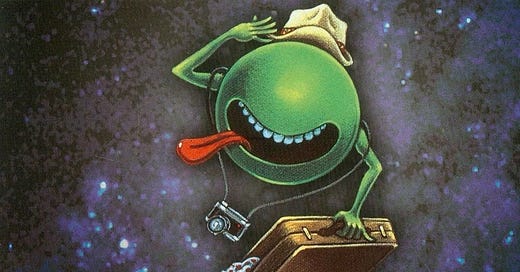Of Fuckbois and Sperm Whales
I got to talk about Douglas Adams and The Hitchhiker Trilogy on a podcast!
I’m so honored to be the lead-off guest for the 7th season of Emily J. Edwards’ wonderful Fuckbois of Literature podcast! You’ll never guess what book I got to talk about!
Douglas Adams—and his five-book Hitchhiker Trilogy—are among the biggest influences on my life, both as a writer and a life-haver. They did much more than present me with a lens through which to understand the mechanics of humor. They presented me with an appropriate way to view the world. Or the galaxy.
Adams was a humanist of the highest order. His books are filled with absurd creatures and ridiculous people, but they’re all human. Even the ones that aren’t technically human are human. Sometimes they’re the most human. Like Marvin the Paranoid Android. His character might be android, but his neurotic obsessions and unrelenting self-pity are as humanoid as they come. I’ve known a number of Marvins in my life. And at least a few of them were me. He’s spot-on in a sometimes uncomfortable way.
Which is one of the things I adore about Adams’ writing. And what I attempt to emulate even more than the humor. (Which, let’s be honest, I’ll never approach in either quality or quantity.) The man did not pull punches. When he saw an aspect of the world worth writing about, he gave it unvarnished. Sure, it might have come glazed in a thick mucus of satire, but that did nothing to soften its barbs.
One of the best examples of Adams’ ability to blend absurd humor with existential weight is the sperm whale scene from the first book. In it, “an innocent sperm whale” is improbably snatched from oblivion and thrust into existence in the upper atmosphere of a seemingly dead planet. And then just… left to drop…
Another thing that got forgotten was the fact that against all probability a sperm whale had suddenly been called into existence several miles above the surface of an alien planet.
And since this is not a naturally tenable position for a whale, this poor innocent creature had very little time to come to terms with its identity as a whale before it then had to come to terms with not being a whale any more.
This is a complete record of its thoughts from the moment it began its life till the moment it ended it.
Ah! . . . What’s happening? it thought.
Er, excuse me, who am I?
Hello?
Why am I here? What’s my purpose in life?
What do I mean by who am I?
Calm down, get a grip now . . . oh! this is an interesting sensation, what is it? It’s a sort of . . . yawning, tingling sensation in my . . . my . . . well I suppose I’d better start finding names for things if I want to make any headway in what for the sake of what I shall call an argument I shall call the world, so let’s call it my stomach.
Good. Ooooh, it’s getting quite strong. And hey, what’s about this whistling roaring sound going past what I’m suddenly going to call my head? Perhaps I can call that . . . wind! Is that a good name? It’ll do . . . perhaps I can find a better name for it later when I’ve found out what it’s for. It must be something very important because there certainly seems to be a hell of a lot of it. Hey! What’s this thing? This . . . let’s call it a tail—yeah, tail. Hey! I can really thrash it about pretty good can’t I? Wow! Wow! That feels great! Doesn’t seem to achieve very much but I’ll probably find out what it’s for later on. Now—have I built up any coherent picture of things yet?
No.
Never mind, hey, this is really exciting, so much to find out about, so much to look forward to, I’m quite dizzy with anticipation . . .
Or is it the wind?
There really is a lot of that now isn’t it?
And wow! Hey! What’s this thing suddenly coming towards me very fast? Very very fast. So big and flat and round, it needs a big wide-sounding name like . . . ow . . . ound . . . round . . . ground! That’s it! That’s a good name—ground!
I wonder if it will be friends with me?
And the rest, after a sudden wet thud, was silence.
That’s us! That sperm whale is all of us. In the course of my conversation with my friend Emily J. Edwards on Fuckbois of Literature, this scene came up. Emily called it “possibly the saddest thing [she has] ever read on the page.” And she’s not wrong. It’s devastatingly sad.
Just like all of … THIS. Whatever this shit is that we’re existing through.
Douglas Adams was manifested in 1952, so he would have been around 25 or 26 when he wrote this scene for the original 1978 Hitchhiker’s Guide to the Galaxy BBC radio show. He had no way of knowing that he was already more than halfway through his descent. He hit the ground in May of 2001, after suffering a heart attack due to undiagnosed coronary artery disease, at the terrifyingly not-old-enough age of 49.
I was manifested in 1973, and as I write this in 2025, I have no idea where I am in my descent. I’ve been falling for 52 years now, and I can see the ground approaching. I didn’t used to be able to, but I can now. I just can’t figure out the distance. I might hit it tomorrow (hopefully not), or I might do it after falling for another 52 years (hopefully not). Who’s to say?
But I can say this: I’m not as fearful of the ground as I used to be. I’ve come to see it as an inevitability. One that we can all see coming towards us. Very very fast. We can cry about it. Or we can be angry about it. Or stoic about it. Or I can laugh about it. That’s the one I choose (on most days). And I thank Douglas Adams in large part for that. Not just for this passage, but for all his passages. All his jokes. All his wisdom. Most of which, I only started to understand on subsequent readings. (And there have been many.)
None of this changes the speed with which the ground approaches. But it does change the context. The way I see it. The questions I have for it. Like…
I wonder if it will be friends with me?
While we’re on the subject, here’s my good friend, Virginia Jones, in conversation with fellow stand-up comedian Jackie Kashian about Douglas Adams and The Hitchhiker’s Guide on The Dork Forest podcast...








